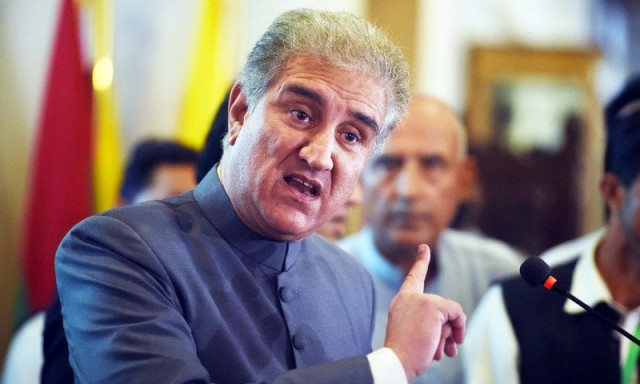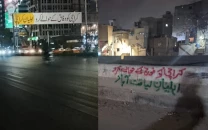Willing to consider Indian pilot's release if it helps de-escalation: FM Qureshi
IAF Wing Commander Abhinandan was captured by troops after PAF struck down Indian jets violating Pakistani airspace

Foreign Minister Shah Mehmood Qureshi. PHOTO: AFP
Speaking to a private TV channel, Qureshi said: "We are willing to consider his release if such a move will lead to de-escalation."
Trump hints at de-escalation between India, Pakistan as US mediates
Tensions escalated dramatically between Pakistan and India on February 14 when a young man – a native of Indian occupied Kashmir (IoK) – rammed an explosives-laden car into an Indian military convoy, killing at least 44 soldiers. India was quick to blame the state of Pakistan for the suicide bombing.
Prime Minister Imran Khan offered every possible help in the investigation, but India turned down the offer and whipped up war hysteria.
On February 26, the Indian Air Force violated Pakistani airspace. The country’s top civil and military leadership declared the violation of airspace by Indian fighter jets “uncalled for aggression” and decided that the country would respond at a “time and place of its choosing”.
On February 27, Pakistan announced it had shot down two Indian fighter jets that attempted to violate its airspace and captured an Indian pilot. The military’s media wing later released a video of the pilot, who introduced himself as Wing Commander Abhinandan bearing service number 27981.
Director-General Inter-Services Public Relations (ISPR) Major General Asif Ghafoor said in a press conference that the armed forces had responsibly retaliated to Indian incursion by strucking a target few miles from an Indian military's administrative unit to ensure there were no human life or collateral damage.
“We decided to not hit a military target or endanger human life. We did not want to retaliate at the cost of regional peace. We do not want escalation," he told reporters.
PM to Modi: 'Let better sense prevail'
A few hours later, Prime Minister Imran Khan took the nation into confidence over the armed forces' response. As escalating tensions fuelled concerns of all-out war between nuclear-tipped Pakistan, Imran warned of catastrophic consequences should “better sense” not prevail.
“We have said that we are prepared for dialogue on terrorism. I once again invite India to come to the negotiating table,” the prime minister said. “Can we afford any miscalculation with the kind of weapons that we have and you have?” he added.
Alluding to the nuclear arsenal of both the countries, he asked "if escalation begins from here, where will it go?” and added that if the situation escalates from here, “it will not be in my or Modi’s control”.
“After the Pulwama attack, we offered India that we are ready for any type of investigation. There were casualties in Pulwama and I can relate to the emotions as we [Pakistanis] have seen such attacks in the past decade. We understand how the victims would feel,” the prime minister said.
The premier ended his speech with another peace talks offer and cooperation in Pulwama attack investigation to India.


















COMMENTS
Comments are moderated and generally will be posted if they are on-topic and not abusive.
For more information, please see our Comments FAQ